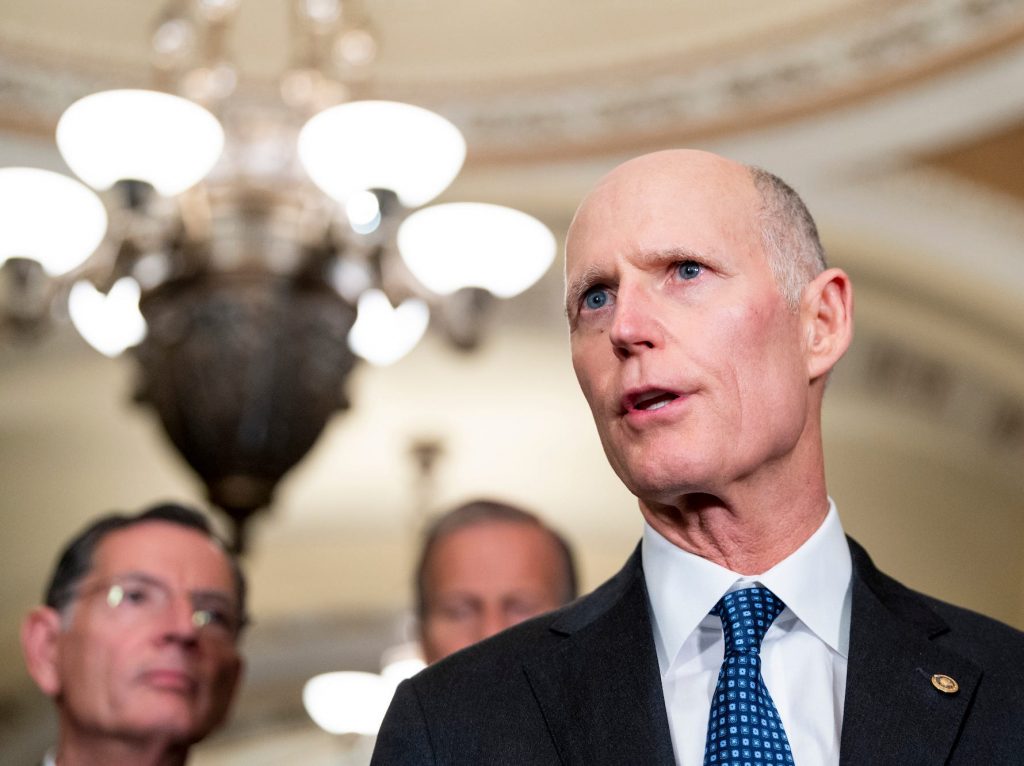- As governor, Rick Scott signed gun-control legislation three weeks after the Parkland school shooting.
- As a senator, he isn't participating in talks on gun-safety measures after the recent mass shootings.
- "Democrats want to talk about gun control, I want to talk about school safety," he said.
Sen. Rick Scott has a history of addressing gun violence as a governor after mass shootings in Florida. But as bipartisan groups of senators negotiate federal legislation, he isn't in the room.
"My experience so far is the Democrats want to talk about gun control, I want to talk about school safety," Scott, a Republican, told Insider. "So there's a complete disconnect."
The recent shootings in Buffalo, New York, and Uvalde, Texas, are pushing Congress to try again to take action on a host of gun-safety measures. Legislation Scott signed as Florida's governor after the 2018 mass shooting at Marjory Stoneman Douglas High School is being held up as an example.
Three weeks after the shooting that killed 17 people in South Florida, Scott signed legislation that committed millions to increasing school safety and tightened gun laws. The legislation, which passed Florida's majority-Republican House and Senate, allowed some teachers to be armed, but it also raised the minimum age to purchase a firearm to 21, imposed a three-day waiting period on gun purchases, and allowed weapons to be confiscated from those deemed a threat to themselves or others. That provision is known as a "red flag" law.
"I think the template from Florida is the right one, which is, do some significant mental health investment, some school safety money and some modest but impactful changes in gun laws," Sen. Chris Murphy, a Connecticut Democrat at the helm of Senate negotiations, said on CNN Sunday. "That's the kind of package we're putting together right now. That's the kind of package I think can pass the Senate."
House Democrats secured passage on Wednesday on a package of bills that would raise the purchase age for semi-automatic rifles to 21, limit access to high-capacity magazines, and ban bump stocks for civilian use. More limited bipartisan measures are under negotiation in the evenly-divided Senate, where anti-gun-control Republicans are likely to block more aggressive action.
Scott leads the National Republican Senatorial Committee, the main campaign arm for the Senate GOP. He told Insider the focus should be on school safety, state-by-state red flag laws, more mental health counselors in schools, threat assessment teams and more coordination of law enforcement agencies. He also touted these measures in 2019 after shootings in El Paso and Dayton.
"I think what we ought to do is some of the things that we did in Florida," he said.
The shootings last month killed 10 mostly Black people in a racist rampage at a Buffalo supermarket and 19 children and two teachers at Robb Elementary School in Uvalde, Texas.
Scott said that, when Murphy asked for information on Florida legislation, he provided it. But when Insider asked Scott if he's part of the negotiations, the governor-turned-senator replied, "No."
Fred Guttenberg, the father of a teen slain in the Parkland shooting, told Insider he isn't optimistic that Democrats will find the Republican votes they need to break a Senate filibuster. Scott is "the telltale person who should be all over this" because he led the way after Parkland, he said.
"But Senator Rick Scott is running away from Governor Rick Scott," Guttenberg said.
Senators are discussing investments in mental health, school security funding, incentives and funding for state red flag laws, and changes to the background check system to purchase guns, Murphy said. But he added that a ban on assault weapons or comprehensive background checks are not on the table.
During the CNN interview, Jake Tapper asked Murphy why senators wouldn't just make the law in Florida a national law.
"Senator Scott, then Governor Scott, passed that law in Florida because it was the right thing to do, but also because Republicans saw it as good politics," Murphy said. "And we have to make the case to Republicans that right now this is good politics. If they want to get reelected, then they cannot stand in the way of the common sense changes that we're talking about right now."
